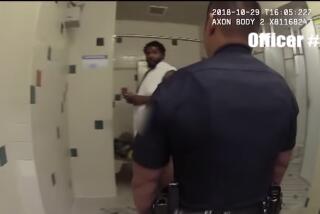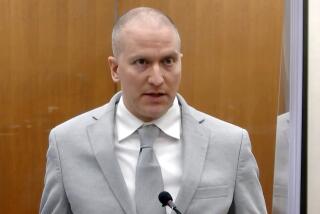VALLEY BUSINESS
SAN FRANCISCO — A federal appeals court ruled Monday that a defense lawyer did such a bad job that the death sentence against his client, who killed a West Covina police officer, should be overturned.
In a 2-1 ruling, the 9th U.S. Circuit Court of Appeals found that the lawyer had spent less than two hours preparing for the penalty phase of the trial. The court found that, if other evidence had been presented, the killer would have had a “reasonable probability” of receiving a sentence of life in prison.
In the underlying case, Michael Jackson, a PCP user, was accused of wrestling away a West Covina police officer’s shotgun in 1983, then killing him with it.
The appeals court judges faulted Los Angeles public defender William Klump, now retired, for not presenting evidence that Jackson was choked by his mother as a boy, that he had once been diagnosed as schizophrenic and that PCP, an illegal drug, might have made him incapable of knowing that he was killing Officer Kenneth Wrede.
In a dissenting opinion, Justice Diarmuid F. O’Scannlain said the missing evidence was not likely to have changed the outcome.
In August 1983, Jackson smoked PCP cigarettes, then ran into the street, dove head first onto the pavement, and pulled and slapped at his hair. Someone called police. When Wrede arrived, he and Jackson fought, then Wrede ran back to his cruiser.
So did Jackson, and grabbed the shotgun in Wrede’s car. They fought for the gun and Jackson won, then chambered a shell. According to trial testimony, Jackson shot Wrede when the officer briefly turned his handgun away from the suspect.
Before trial, Klump hired two psychiatrists to examine Jackson and determine whether he had the mental capacity to form the intent needed to be guilty of murder.
Each psychiatrist’s report contained information likely to favor Jackson, such as the opinion that he was too intoxicated to know the seriousness of his actions, as well as information that might have hurt his case, such as findings that he was no longer mentally ill.
Because some of the evidence beneficial to Jackson was inadmissible anyway, Klump decided not to use either report or testimony from the psychiatrists.
The appeals court pointed out Klump could, however, have used that and other evidence during the penalty phase to win leniency.
The only preparation Klump made for the penalty phase was an interview with Jackson’s mother and estranged wife, and a review of Jackson’s military and juvenile records.
The court criticized Klump for failing to present more evidence about Jackson’s mind.
“With medical evidence, the jury would have been presented with a different medical picture of Jackson’s state of consciousness than the one they received, which was no picture at all,” said Judge William C. Canby Jr., in the majority opinion.
More to Read
Sign up for Essential California
The most important California stories and recommendations in your inbox every morning.
You may occasionally receive promotional content from the Los Angeles Times.










